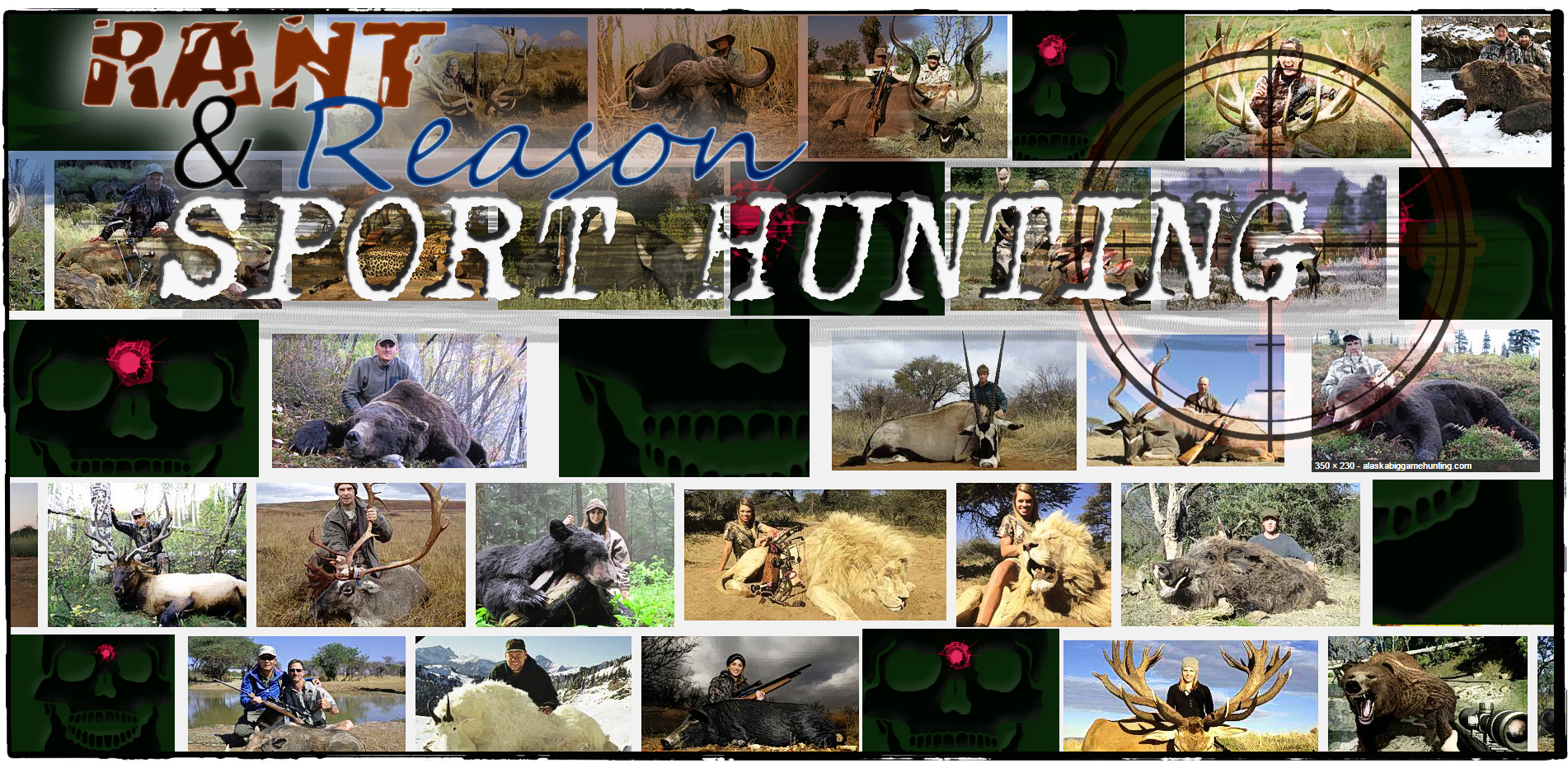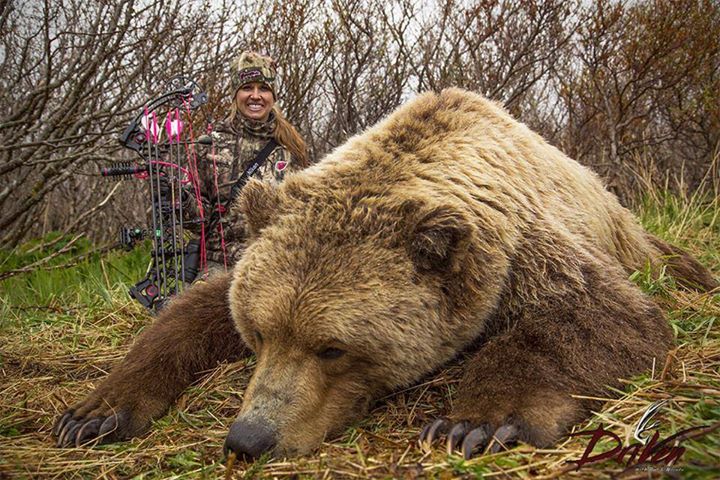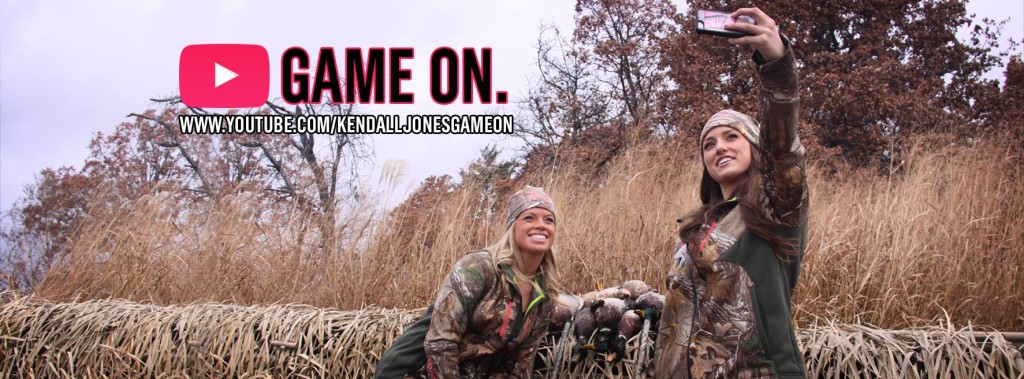The Rant & Reason articles give license to vent, curse, lament
and generally blow off steam before settling down to address the issues
in a cool headed and metrically reasoned way.
Wandering through my newsfeed I discovered this staggering display of ignorance:
The huntress had this to say: I just shot my DREAM animal eye to eye...watched him come from 100 yards away and shot him at 23 steps with my Mathews, Inc. Bow! Big 9ft Brown Bear hits the DRIVEN dirt. My biggest accomplishment yet in my dream career! UNBELIEVABLE video can't wait for you too see it!! So very blessed! Thank you to my ace guides Rebecca, Cole and Stig on a true dream hunt of a lifetime! My top thing on my bucket list is officially checked off here in Alaska! ScentBlocker #dreamhunt #oncloud9 #whatnext
In all of the natural kingdom there is but one creature who chooses to hunt for pleasure.
Or say…for sport?
RANT:
I hope those who hunt for sport will continue unabated.
Continue to wantonly hunt and mount lifeless heads on their trophy room walls
until there is simply no wildlife left.In fact, I hope they kill ’em all!
Every last lion, deer, boar, bear, rhinoceros, elephant, gorilla, buffalo, giraffe, tiger…down to the last pheasant, rabbit, duck and gerbil!That way — when they have tied the last carcass to the hood of their pickup truck and wonder what to hunt next,
they will arrive at the conclusion the tree huggers reached long ago.
That extinction is permanent.Then, with luck, they will put the vehicle in park,
admire the result of their ignorance on the hood of the vehicle,
put the gun in their mouth,
and do the rest of us a favour!There are 7 billion of us on the planet you short sighted imbeciles —
what the hell happens when everyone goes hunting?
The word you are looking for is not “conservation” — its called annihilation. Ours!
REASON:
Confronted by the choice between starvation or hunting, the dominant instinct for survival will trump all other considerations. Any reasonable person must concede this. Under extreme conditions hunting can be a means to survival. Granted.
However, a quick poll of any search engine will decisively demonstrate that sport hunters are not starving. In fact considering the costs associated with modern sport hunting, it’s a safe bet that most could easily afford to drive their fuel hungry pickup through the nearest drive thru. And without wishing to hit below, or in this case, above the belt, it genuinely looks like few of them miss the opportunity. In other words, these people are about as safe from the ravages of starvation as it is possible to get.
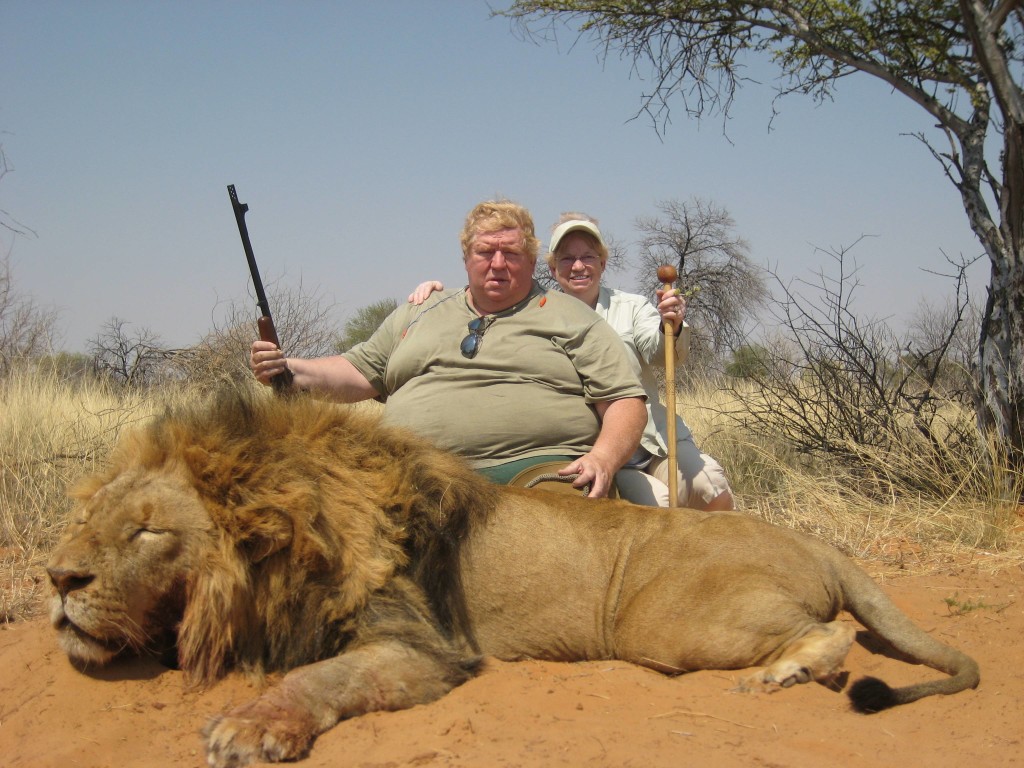 No. It seems that Sport Hunting feeds the hungriest and bloodiest appetite of them all: The Human Ego. Although, when considered against the escalating depletion of species due to poaching and over-hunting, human ignorance would be a close runner up. Still, nothing is as voracious a killer as ego gratification and pride; which it seems is alive and well if you count the number of selfies taken by hunters.
No. It seems that Sport Hunting feeds the hungriest and bloodiest appetite of them all: The Human Ego. Although, when considered against the escalating depletion of species due to poaching and over-hunting, human ignorance would be a close runner up. Still, nothing is as voracious a killer as ego gratification and pride; which it seems is alive and well if you count the number of selfies taken by hunters.
For those who have chosen plant based diets as the only way to conscionably support untold billions of hungry humans these sport killers are truly vile.
In fact, it really is difficult to stare into the smiling faces of people too ignorant to understand their contribution to the scale of the problem. Proudly and stupidly casting their stone into the already unstoppable landslide of encroaching extinction. Those too detached from reality to know shame for their actions as they pose proudly before once majestic animals. Animals who have been needlessly reduced — to a trophy. Usually from a safe, albeit lethal distance.

This discussion is not for them though. They will not read these arguments and have a change of heart. That would require an investment in a truth which, if they believed it, must limit their appetites. Which is perhaps a problem even closer to the core than ego. These hunters still see the world as full of limitless natural riches put on the earth exclusively for their gratuitous personal use.
But what about your average hunter out in the woods for a bit of gun barrel conservation. What about the guy who just wants to go out in the woods like his father before him and shoot something to drag back to his bungalow. You know, the harmless hunter with a hunting license and a dream.
Well, one of the arguments proffered by ‘legitimate hunters’ is that they eat what they kill which is meant to exonerate them from the guilt of association with pleasure hunters.
This would sound reasonable if it didn’t selectively exclude the unbelievable number of alternatives to wild meat which are widely available to first world consumers.
Imagine if you walked the aisles of your local supermarket and took only one of every product they sell. How many shopping carts do you think that would fill? In fact, let’s be vegan about it. Let’s assume you grabbed one of every product they sell that doesn’t contain animal byproducts. How much food would you have? Most would agree the amount would be considerable. According to market research company FMI, even a modest grocery store stocks between 15,000 to 60,000 products at any given time.
But what about the claim from some hunters that they hunt and kill wild game, because they don’t want antibiotics and chemicals in their food? To which any rational person would say, then rather than wipe out the few remaining wild animals, why not put that effort into improving the state of factory farms. Or better yet, switch to a plant based diet as Albert Einstein did in the last year of his life. Or even simply reduce meat consumption.
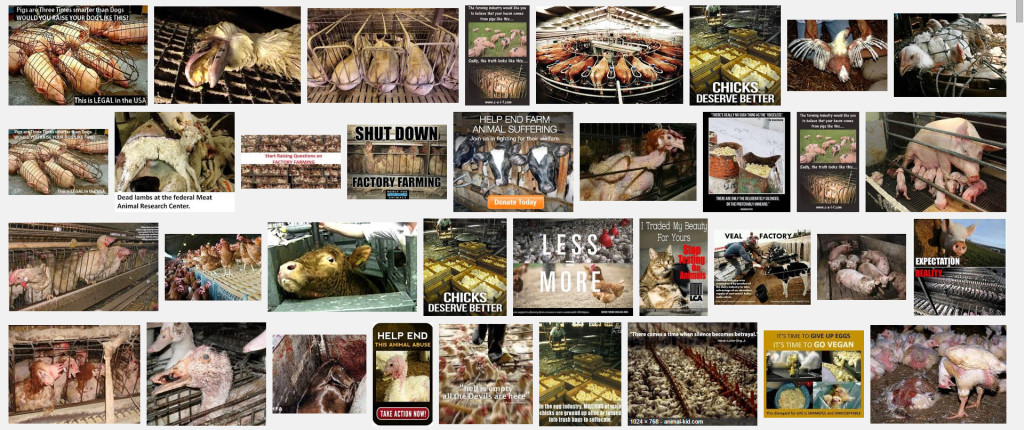
When so much of the environment is polluted, what do you think the moose or ducks are eating? How clean do you think the water is downstream from pulp and paper mills, factory farms and mining operations? The tradeoff in contaminants between antibiotics and growth hormones for mercury may not be as good a deal as it first seems. What’s more, the effects of mercury and other contaminants on children and infants are much higher than for adults so the most direct victims of hunting can be the hunter’s own family. So while eating wild game is an argument that aspires to legitimacy by appealing to a health conscious public, the evidence simply doesn’t support this claim.
What is stunningly obvious, but is rarely if ever mentioned, is why foraging never makes it onto the list of options. If 90+% of the biomass of any given forested area is plant based, then doesn’t it stand to reason that this should be the first item on the survivalists menu?
Yet it isn’t. Instead there is talk about the economic advantage to hunting wild game over buying store bought meat. This argument would carry water if it weren’t for the fact that the amount of money in camouflage, animal call accessories, motion sensing hunting cameras, ammunition, rifles, licenses, travel, hunting guide and other fees could buy meat for two families for several years. So why do they hunt?
Peel away the pale justifications like, “I like spending time in the wilderness.” — which you can do without a gun. Or, the perennial favorite, “There will be too many animals if I don’t shoot me some!” — which is both patently absurd and humorously self-negating. The short reply to that nuget is that nature managed itself long before weekend warriors sat in tree stands with a bag of doritos, a 6-pack and a high powered howitzer. When the health of a habitat is measured by the abundance, diversity and sustainability of flora and fauna, too many animals is a non sequitur of idiotic proportions. Too much wildlife is not a problem any biologist is complaining about anywhere — ever! However, in light of the fact that wildlife is disappearing at a nearly logarithmic rate, it might be time to take our collective chances with that.
So once again we must ask, why do they hunt? Once you debunk the myths and misinformation and flake away the unsupportable arguments in view of scientific evidence, then you are left with the inescapable and ugly truth:
They hunt, because most enjoy stalking and killing.
And among this lot, perhaps the ugliest of all are the sport hunters who really just want to post that picture of their ‘Trophy’ on a website. Second in contemptibility to sports hunters would be those who kill and maim animals as ritual, or to work through deep psychological issues. And nearing the bottom are those who kill not because they are starving, not because they necessarily like killing, but because they like the taste of the meat. Aparently the human stomach knows no conscience. And bloated ego knows even less. Especially perhaps the ones that are most well fed.
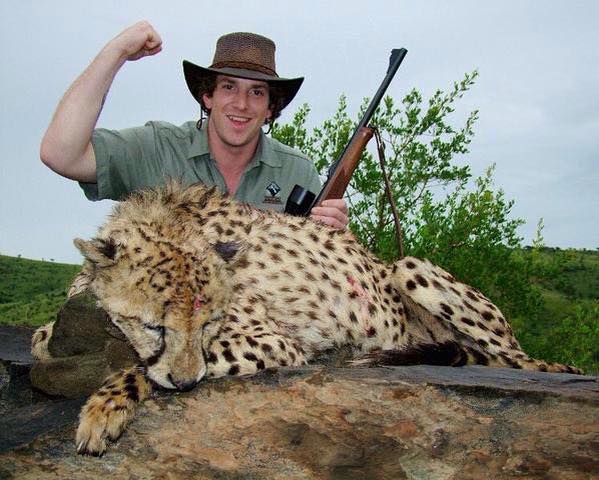 Yet even with a preponderance of evidence weighty enough to make the floor boards creak, there are still those who steadfastly maintain that modern hunting practices, habitat destruction and indiscriminate poaching are not having a critical effect on wildlife. Many will point to Wildlife service’s yearly predator harvests as a necessary means to curb the encounters between people and game. Encounters which rarely result in a fair shake for hapless wildlife who, facing a shrinking habitat, must venture into the human world. Yet this too is a red herring as a 2013 study on remedial hunting practices on cougar populations points out. The study which drew data from 39 counties in Washington state, counterintuitively revealed that cougar predation actually went up after a successful cougar harvest the previous year! So both the notion that humans need to take the place of predators which humans also apparently need to shoot are both demonstrably false assertions.
Yet even with a preponderance of evidence weighty enough to make the floor boards creak, there are still those who steadfastly maintain that modern hunting practices, habitat destruction and indiscriminate poaching are not having a critical effect on wildlife. Many will point to Wildlife service’s yearly predator harvests as a necessary means to curb the encounters between people and game. Encounters which rarely result in a fair shake for hapless wildlife who, facing a shrinking habitat, must venture into the human world. Yet this too is a red herring as a 2013 study on remedial hunting practices on cougar populations points out. The study which drew data from 39 counties in Washington state, counterintuitively revealed that cougar predation actually went up after a successful cougar harvest the previous year! So both the notion that humans need to take the place of predators which humans also apparently need to shoot are both demonstrably false assertions.
The argument that hunters are required to take the place of natural predators is almost too easy to refute. What happened to the predators that used to do their selflessly appointed job? Only one fact is required to dismiss this false assertion. If hunters acted like the predators they are supposed to be replacing they would only hunt the sick and infirm.
A fact of predation which is often lost on hunters is that natural predators must balance their efforts against the stringent cost/benefit regression analysis of survival. The expenditure of energy to predators is so high(ie: stalking, chasing, subduing etc.) that they intentionally target the sick, the old, or the infirm to maximize their returns. The result: A healthier, more robust prey population and stronger genetic pool.
This point may be moot for Creationist hunters, but culling of the less fit members of a population puts evolutionary pressure on the species to maintain robust immune and defensive capabilities. However, since hunters and particularly sport hunters are responding to egocentric rather than enviro-centric concerns, they shoot only the largest and healthiest animals. Particularly those with the most prominent display features such as antlers, horns, pelts, or tusks. And the measurable, scientific result of this? According to a paper published in the The American Genetic Association © 2011 there has for instance been a measurable decline in the horn size in Rams of the Ovis canadensis, commonly known as the Big Horn Sheep, or Desert Big Horn Sheep. This same phenomena has been tracked in Africa where the Elephants are being born with increasingly smaller tusks as a result of trophy hunting and ivory poaching. So what does it mean? It means that the pressure on game animals is so intense that it is causing them to hyper-evolve into anything that will make them less appealing to predators with high powered rifles.
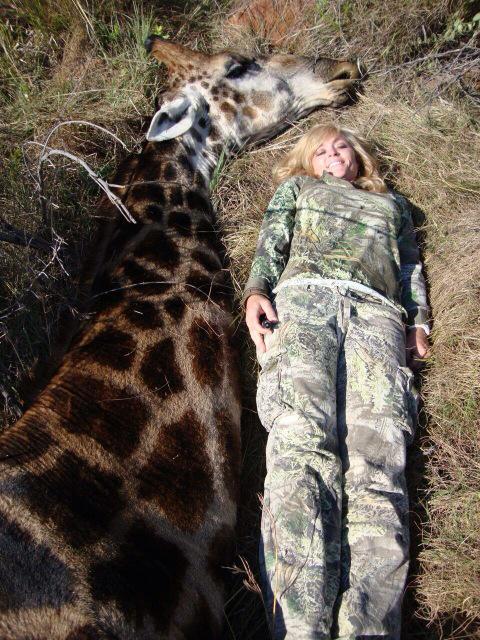 What’s more, the hunting of apex predators such as Lions, Bear, Sharks, Wolves and the like has an unforeseen knock on effect known commonly as Trophic Cascades.
What’s more, the hunting of apex predators such as Lions, Bear, Sharks, Wolves and the like has an unforeseen knock on effect known commonly as Trophic Cascades.
Simply put, predators chase and eat prey, who in turn chase and eat their own prey and so on. When you take out the apex predators at the top, you affect the behavior and abundance of prey not only directly on their menu, but ultimately on every creature’s menu throughout the food chain. In some cases the effects have been so powerful, they can even cause rivers to change course, or affect the degree of salinity in the oceans! A mathematical corollary strongly resembles the famous butterfly effect in which a butterfly flapping it’s wings in Japan can cause an invisible but quantifiable chain of events which ultimately and inexorably lead to a hurricane in Haiti. The point here is that we are only just beginning to understand how far reaching the effects of Trophic Cascades are to the global ecosystem and of course, all life living within it.
But do we really need this much science to inform our opinions? The short answer is yes, but there is still room in this debate for the personal time lapse observation known as experience. While our memories are often fallible, many of us have accrued our own evidence(albeit anecdotal) of the decline of species. As anyone who has been a long time hiker or camper will tell you; their animal encounters are growing fewer each year. Both absurd and bitterly ironic is the fact that many of those who are complaining about a lack of wildlife, are hunters. This fact is dramatically borne out by the need for game and forestry services to bolster local game populations in many parts of the US with animals which are bred in captivity for the express purpose of being slaughtered by eager hunters. This fact makes ridiculous the notion put forth by hunters that if they don’t kill as many beasts as they are licensed to, then the rampaging animal population will destroy some precarious balance. It leaves one to wonder if the balance they are referring to is the one they are actively destroying.
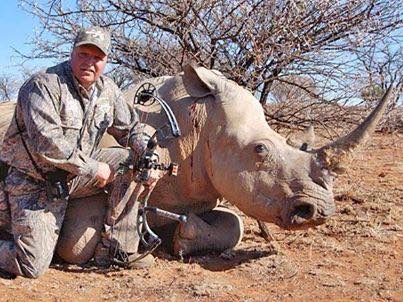 It is practically a statistical certainty that at some point geneticists will ferret out a hunting gene in humans. It may even have had survival value at one point. But one thing is for certain about ancient hunters ~ it wasn’t a sport. It was survival. They would die if they didn’t hunt and gather(hunters ignore the gathering part). If we broaden the definition of natural exploitation exemplified by sport hunting to include that of industry and rampant consumerism, then we begin to glimpse the problem as an ideological one.
It is practically a statistical certainty that at some point geneticists will ferret out a hunting gene in humans. It may even have had survival value at one point. But one thing is for certain about ancient hunters ~ it wasn’t a sport. It was survival. They would die if they didn’t hunt and gather(hunters ignore the gathering part). If we broaden the definition of natural exploitation exemplified by sport hunting to include that of industry and rampant consumerism, then we begin to glimpse the problem as an ideological one.
Unfortunately for the natural world, the document which guided and justified the behavior of the industrialized nations of the world was the bible. This ancient text spoke directly to man’s ego by stating that man shall “…have dominion over the fish of the sea and over the birds of the heavens and over the livestock and over all the earth and over every creeping thing that creeps on the earth.” This misguided doctrine took the species of man out of Nature and placed him squarely above it. As man became increasingly insulated from natural laws by mechanized supply chains and the year round abundance afforded by the agrarian revolution, so too did his sense of himself as responsible to nature. From this point on people began to believe that Nature was somehow apart from mankind, beneath them somehow. Humans venture into nature, they are not of nature. And none more so than the modern sport hunter. Thankfully many of us understand that we are one gene away from our simian cousins and are proud of it. We are nature. It gives us a place in the universe ~ a kind of metaphysical continuity. It seems clear however that as our environmental issues mount, the divide between the takers and the givers will grow.
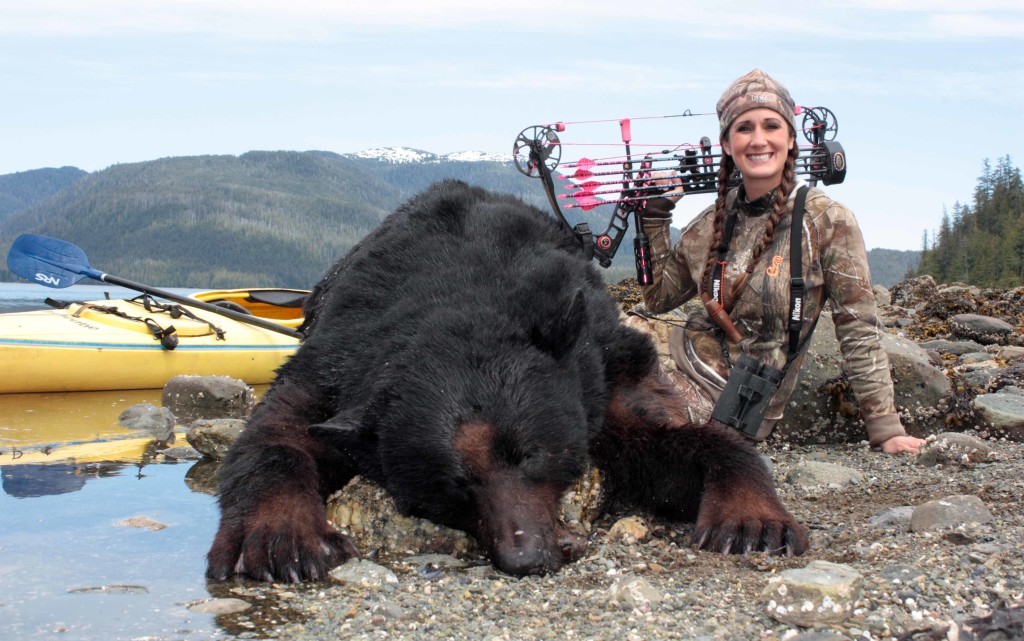 One excellent source of perspective on the notion of human beings as a part of the natural world is simply and poetically illustrated in “The Lakota Way: Stories & Lessons for Living” by Joseph Marshall. Its a compendium of stories which the native people of the plains passed down through aural tradition to transmit their values and beliefs. Far from being the stilted or dogmatic preaching of a controlling belief system; these tales are human tales. Shared insights. These ancient stories give us another way to look at ourselves as reflected in nature. To stretch that metaphor a bit – they are not one-way mirrors into an extinct way of life, but rather windows that can transform the view of ourselves as “aliens on our own planet” — into naturalized beings: The human animal. Many hunters associate hunting with an escape from modernity and a return to primitive — even aboriginal values. However, it seems the only target sport hunters are able to miss consistently, is the point: There are too many humans on the planet. Too many to sustain the brutal cost of sport hunting. Too many to feed with ever shrinking wild life. Too many even to sustainably feed with assembly line livestock!
One excellent source of perspective on the notion of human beings as a part of the natural world is simply and poetically illustrated in “The Lakota Way: Stories & Lessons for Living” by Joseph Marshall. Its a compendium of stories which the native people of the plains passed down through aural tradition to transmit their values and beliefs. Far from being the stilted or dogmatic preaching of a controlling belief system; these tales are human tales. Shared insights. These ancient stories give us another way to look at ourselves as reflected in nature. To stretch that metaphor a bit – they are not one-way mirrors into an extinct way of life, but rather windows that can transform the view of ourselves as “aliens on our own planet” — into naturalized beings: The human animal. Many hunters associate hunting with an escape from modernity and a return to primitive — even aboriginal values. However, it seems the only target sport hunters are able to miss consistently, is the point: There are too many humans on the planet. Too many to sustain the brutal cost of sport hunting. Too many to feed with ever shrinking wild life. Too many even to sustainably feed with assembly line livestock!
It turns out that Karma is a fact of nature. Causality’s Boomerang, if you will. And we better learn how to either limit our appetites or duck, because if it’s true that nature abhors a vacuum, then the bullet shaped hole in the middle of the ecosystem should indicate the scale of the retribution coming our way. When so many species are hanging by a thread, hunting must be regarded as a zero sum game. An atavistic impulse as lethal to the species as any virus ever encountered. A virus in desperate need of a cure.
So here is an axiom espoused by nearly every ancient culture who ever lived apart from our own:
“Everything is connected” – literally connected. There! Mystery solved. Act like everything you do affects every other living thing and voila! Nature takes you back into the fold. A concept we may yet have time to learn before the problem of man’s ill use of the planet solves itself.
